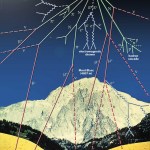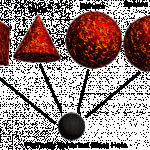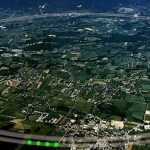Black Holes
The good news: Despite their best efforts, the folks at CERN failed to produce a black hole that sucked the entire earth into it! That would have been cool. The bad news is for string theory. What might be one of the few empirical tests for that tangle of math and stuff seems to have come out negative. From CERN:
The CMS experiment at CERN's Large Hadron Collider (LHC) has completed a search for microscopic black holes produced in high-energy proton-proton collisions. No evidence for their production was found and their production has been excluded up to a black hole mass of 3.5-4.5…
"Black holes are where God divided by zero." -Stephen Wright
Yesterday, I told you about all the evidence for the Black Hole at the center of our galaxy. In particular, we see multiple stars orbiting a single point that emits no light of any type at all.
And, perhaps unsurprisingly, the comments became very active. So let's take a look at some of what was said, and let's see what we can further learn about black holes from answering your questions.
I see the stars orbiting on their own orbits, but I mean, all orbits seem quite different to me, there´s no central point they are orbiting…
"Why it is that of all the billions and billions of strange objects in the Cosmos -- novas, quasars, pulsars, black holes -- you are beyond doubt the strangest?" -Walker Percy
Black holes. You've all heard them before, and you can visualize them pretty easily. How so? Start by thinking about the Earth.
Held together by the immense force of gravity, the Earth is a difficult world to leave.
What exactly do I mean by that?
It takes a tremendous amount of energy to get off of the planet Earth. If you were at the surface of the Earth, you'd have to be moving at around 40,000 km/hr (or 25,000 mi/…
"Consideration of particle emission from black holes would seem to suggest that God not only plays dice, but also sometimes throws them where they cannot be seen." -Stephen Hawking
Last week, I wrote about how high-energy cosmic rays strike Earth's atmosphere and wind up bombarding everything on Earth's surface with super-fast moving particles, some of which are even unstable!
In passing, I mentioned that these cosmic rays (mostly protons) come from a variety of sources, such as the Sun, neutron stars, supernova remnants, the centers of galaxies, and (everyone's favorite) black holes.
(…
"The whole fabric of the space-time continuum is not merely curved, it is in fact totally bent." -Douglas Adams
As many of you know, if you take a whole bunch of mass, and you've got nothing going on except gravity, it's going to gravitationally collapse. And if atoms, nuclei, pressure, and nuclear reactions don't (or can't) prevent that gravitational collapse from running away, you're going to wind up with a black hole.
But last week, I told you that if you took all the matter in the Universe and shaped it into a cylinder, you'd actually wind up with a huge cylinder of solid matter, as big…
A large part of my affection for science comes from the thrill of terror I get when a particularly insane piece of science news hits the presses. When an article begins with a sentence like, "there is something strange in the cosmic neighborhood," or "all the black holes found so far in our universe may be doorways into alternate realities," my pulse quickens and a dormant paranoia is roused from deep within my breast: a sensation of joyful panic. I used to call this the "fourth-grade nightmare fantasy." This might be because as a long-time science fiction adept, I tend to read science news…
"No matter how dark things seem to be or actually are, raise your sights and see the possibilites -- always see them -- for they are always there. -Norman Vincent Peale
Dark matter. I talk about it a lot here for a number of reasons. These include:
the fact that it makes up about 85% of the mass of the Universe,
the only way (so far) that it appears to interact with anything is gravitationally, and
from our observations, we've learned that it's made up of slow-moving, massive particles.
You put what we know about dark matter into a simulation, and it tells you what type of structure you…
The Truth is far more powerful than any weapon of mass destruction. -Gandhi
Last time, I spoke to you about how tides work on Earth.
In a nutshell, a nearby massive body (like the Moon or the Sun) pulls on the Earth's center due to its gravity. But the portion of the Earth that's closest to that massive body gets pulled with a slightly greater force, while the portion that's farthest gets pulled with a slightly smaller force. This differential force, known as a tidal force, causes objects to be stretched out, and causes our oceans to bulge at the points nearest and farthest from the Moon,…
The Aspen Center for Physics is holding its annual series of winter workshops, with the final, double sized workshop being on the astrophysical topic of Black Holes.
Aspen Center for Physics
Yes, I am there, organizering, Daniel Holz from CV is also here, along with 100+ other luminaries, and, yes, he's also been too busy to blog.
The discussion has been lively and broad, covering everything from formation and accretion of low mass stellar black holes, through to mergers of supermassive black holes, via the puzzle of intermediate mass black holes.
Wednesday evening, Prof. Andrea Ghez gave…
All that matters, in the real world, is that something is both massive and compact enough so that, within a certain radius, light cannot escape from it. That is the astrophysical definition of a black hole. -me
We've been talking about black holes a lot recently, and with good reason. They're fun to think about. These objects that collect matter, energy, light, and anything else that dares to cross its event horizon. It's only natural to ask what might lie beneath that dark area that no light ever escapes from.
Image credit: mondolithic.com.
In 1916, everyone assumed that whatever happened…
The cradle rocks above an abyss, and common sense tells us that our existence is but a brief crack of light between two eternities of darkness. -Vladimir Nabokov
Last Friday, I posed a question to you, and you kindly responded by voting as to whether, when you crossed the event horizon of a black hole, the lights would stay on or go off. The results so far?
What do I have to say? Good for you! Just because no light gets out doesn't mean that you can't see the light that comes in! When you're in your spaceship, very few things matter.
You could be in a strong gravitational field, like exists…
Black holes have come up a couple of times this week, and I've always wondered something. When you fall into a black hole, all sorts of strange things happen.
The most well-known one is that nothing -- not even light -- can ever escape once it falls in. Well, my question is, if you fell in to a black hole, as you crossed the event horizon in your sturdy, well-lit spaceship, would the lights stay on or would they go out as you crossed into the black hole? (Ignoring the tidal forces that would rip you and the spaceship apart.)
In other words, you've read the first 1497 pages of the Count of…
Why it is that of all the billions and billions of strange objects in the Cosmos -- novas, quasars, pulsars, black holes -- you are beyond doubt the strangest? -Walker Percy
When you watch someone fall into a black hole, what you actually see is pretty surprising. You see, a black hole's gravity distorts the space around it, and it does so without providing any light of its own, giving you a unique perspective on the Universe.
Well, if you watch someone else fall in, you'd see them approach the black hole normally, and then the bizarreness starts. As they go deeper and deeper into the…
In the comments on one of my posts, someone pointed me towards Stephen Crothers, who gives the following argument (in a nutshell) as to why black holes cannot possibly exist:
General Relativity is our theory of gravity, which relates the curvature of space to the gravitational acceleration of objects.
This theory only works in certain regimes; it breaks down at the point of singularities.
A black hole, as predicted by Schwarzschild, is a singularity.
Therefore, since singularities are forbidden by General Relativity, there is no reason to think that black holes exist.
(You can watch his…
Who is correct here? We don't know, you don't know, it is uncharted territory. Would you bet the entire human history and the existence of our solar system on it?
I wouldn't.
--from a user comment on my old website on the topic of the Large Hadron Collider
Back when all the hype and hoopla concerning the LHC startup had people afraid that the Large Hadron Collider would create a black hole that would eat and destroy the Earth, I tried to quell some of these fears. At my old site, I wrote three articles explaining why the Earth was safe, and why -- even if the worst-case scenario came true…
Buzz Out Loud is one of my favorite tech podcasts. Unfortunately, I am a little behind in the episodes. However, in the episode 900 there was an email from a listener regarding LHC and black holes. The emailer claims that a massive black hole would mess up Earth's orbit. This is not quite true.
I was getting ready to make a lengthy post about how black holes work, but did a way more awesomer job than I could do. Stefan and Bee describe some very important points:
First, black holes created in the Large Hadron Collider are based on a theory that has not really been verified. So, it…
This has been all over my inbox since the press release came out yesterday; it's been on slashdot (thanks Brian), it's been at space.com, and there's a mediocre writeup on Universe Today. What's the big news? Black Holes don't destroy information after all!
What is this whole information thing, anyway? Take a look at all the normal stuff in the Universe: photons, protons, neutrons, and electrons, for example. They have lots of different properties each. They move around one another, they get bound and unbound from one another, they exert forces on one another, etc. They're aware of one…
No, not because it was too young to drink! Scientists at the Max Planck Institute for Extraterrestrial Physics were looking at some X-ray objects, and discovered something really weird: a very bright X-ray source moving out of a galaxy at nearly 3,000 kilometers/second! This thing is a goner. If our Sun were moving at even one quarter of that speed, it would get thrown out of our galaxy.
Now, here's the kicker: this isn't just any old object getting tossed out of a galaxy, it is a huge black hole! How huge? About 300,000,000 times the mass of our Sun. You read that number right: 300,000,000…
Since the dawn of time man has yearned to destroy the sun. - C. M. Burns
There's no need to stop at the Sun, though. Since yesterday was Earth day, I thought it was only appropriate to spend today telling you how not only to destroy the Earth, but to effectively destroy the entire Universe. To tell you this story, we have to go all the way back to the beginning, to just before the big bang.
The big bang was when the Universe was hot, dense, full of energy, and expanding very quickly. The Universe was also spatially flat and the same temperature everywhere, and full of both matter and…















